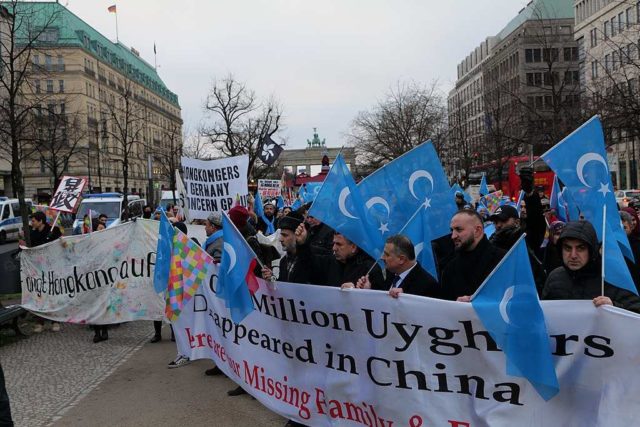
Uyghurs warned against divulging ‘state secrets’ before UN right chief ‘s China visit Demonstration for the rights of the Uyghurs. (Leonhard Lenz/WikiCommons)
This article was originally published by Radio Free Asia and is reprinted with permission.
Chinese officials in Xinjiang are warning Uyghurs not to divulge “state secrets” during a visit by United Nations human rights chief Michelle Bachelet this month, officials in the western region said.
A Chinese government video instructing Uyghurs on 10 things not to do has been shared widely on Douyin, a Chinese version of the TikTok short video app, in Xinjiang, the sources said.
The Chinese Communist Party (CCP) Committee of Yarkand (in Chinese, Shache) county in Kashgar (Kashi) prefecture recently uploaded the video to social media. It features 10 female CCP officials from the county reciting the “10 commandments” and warning Uyghur residents not to disclose so-called state secrets.
Chinese officials in Xinjiang told RFA that a government notice with the same title had been issued two months ago.
“It’s been around two months since we received it,” said a female police officer from Yarkand township.
When RFA pointed out that the same directive was previously in place, the officer said it was renewed because of the U.N. delegation’s visit.
A five-member advance team from the Office of the U.N. High Commissioner for Human Rights (OHCHR) arrived in China last week to prepare for a visit by Bachelet expected in May, though the dates have not yet been disclosed.
The U.N. human rights chief and former Chilean president first announced that her office sought an unfettered access to Xinjiang in September 2018, shortly after she took over her current role. But the trip has been delayed over questions about her freedom of movement through the region.
Uyghur activists and other rights groups are pressing for Bachelet to have independent and unfettered access to Xinjiang to conduct a meaningful investigation of alleged atrocities in the region.
Human rights activists say that by issuing such notices and promotional videos, China is threatening the region’s residents not to disclose any information about the government’s widely documented repression of Uyghurs.
A directive not to take calls
RFA contacted Chinese government offices in several cities in Xinjiang to ask officials about the preparations that were underway before Bachelet’s arrival. Most said that authorities have warned locals not to accept calls from unknown phone numbers and not to answer questions from the U.N. human rights team without approval from the government.
“We have a directive to not answer phone calls starting with zero,” said a female official from Yarkand county’s Dongbagh village, referring to international calls in China.
A security chief from the No. 2 village of Imamlirim township in Aksu (Akesu) prefecture’s Uchturpan (Wushi) county said people were informed about the directive at a village meeting.
“Don’t talk to any foreigners and don’t answer phone calls starting with zero. This was told to us at the village meeting,” he said.
In the Yarkand county CCP video, authorities warned Uyghurs in sometimes threatening manner not to divulge, question or argue about “state secrets.”
A male police officer from the Dongbagh village police station said he was worried about answering questions from RFA because of the government directive.
“We have a directive on not answering questions from unknown and strange phone calls and people,” the officer said.
Zumret Dawut, a Uyghur who was held in an internment camp and says he was forced to undergo permanent sterilization surgery, said Chinese authorities have always required Uyghurs in Xinjiang to keep quiet whenever U.N. human rights commissioners have visited the region.
“Similar directives existed when I was there,” Dawut said. “They asked us the same things before flag raising ceremonies in the morning. They would ask us not to speak to foreigners and not to talk to them about the [internment] camps, and so on.”
Up to 1.8 million Uyghurs and others have been held in a vast network of internment camps operated by the Chinese government under the pretext of preventing religious extremism and terrorism among the mostly Muslim groups. China has said that the camps are vocational facilities for Uyghurs and meant to deter religious extremism and terrorism.
“They would ask us to stay away from foreigners and if asked about China, they would say talk to them about positive things about the country,” Dawut said.
‘China is afraid’
Bachelet will be the first U.N. human rights commissioner to visit China since 2005. Her office has been under pressure from rights activists to issue an overdue report on rights violations by Chinese authorities targeting Uyghurs and other Turkic communities in the Xinjiang. Uyghur groups have demanded that office issue the report before her visit.
RFA previously reported that since 2009, Uyghurs arrested on charges of “leaking state secrets” have been sentenced to more than seven years in prison.
Uyghurs are sensitive to the consequences of saying too much, Dawut said.
“Despite this, the authorities still felt it was necessary to continue such propaganda,” Dawut told RFA. “The need for this Chinese heightened alert on tightening the information leaks on of state secrets may have been the result of the forthcoming visit by a U.N. investigation team.”
Ilshat Hassan Kokbore, a Uyghur political observer who lives in the United States, said a country’s state secrets should only be known by high-ranking officials or institutions that govern that country, and not the public.
“If the Chinese government is urging the rural population of the Uyghur region not to divulge so-called state secrets, then what is being hidden here is not a secret, but all the policies and practices of the state — which is the Uyghur genocide,” he told RFA.
“China is afraid that the U.N.’s Bachelet will discover the truth if Uyghurs speak out about the Chinese policy of genocide,” Kokbore said. “That’s why they have initiated this campaign of deception.”




